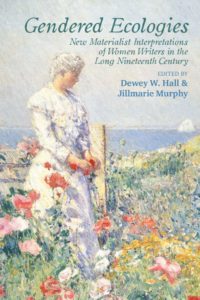Edited by Dewey W. Hall and Jillmarie Murphy. Clemson University Press, 2020.
 Gendered Ecologies: New Materialist Interpretations of Women Writers in the Long Nineteenth Century considers the value of interrelationships that exist among human, nonhuman species, and inanimate objects as part of the environment in the work of a diversity of nineteenth-century female writers. The collection engages with current paradigms of thought influencing the field of ecocriticism and, more specifically, ecofeminism. Various theories are featured, informing interpretation of literary and non-literary material, which include Anthropocene feminism, feminist geography, neo-materialism, object-oriented ontology, panarchy, and trans-corporeality. In particular, neo-materialism becomes a means by which to examine literary and non-literary content by women writers with attention to the materiality of objects as the aim of inquiry.
Gendered Ecologies: New Materialist Interpretations of Women Writers in the Long Nineteenth Century considers the value of interrelationships that exist among human, nonhuman species, and inanimate objects as part of the environment in the work of a diversity of nineteenth-century female writers. The collection engages with current paradigms of thought influencing the field of ecocriticism and, more specifically, ecofeminism. Various theories are featured, informing interpretation of literary and non-literary material, which include Anthropocene feminism, feminist geography, neo-materialism, object-oriented ontology, panarchy, and trans-corporeality. In particular, neo-materialism becomes a means by which to examine literary and non-literary content by women writers with attention to the materiality of objects as the aim of inquiry.
Dewey W. Hall and Jillmarie Murphy, “Introduction”
Heather Braun, “Beyond the Bower: The Garden, the Tower, and the Fate of the Embowered Woman”
Louise Willis, “A Space of ‘unwonted liberty and pleasure’: Charlotte Bronte’s Treatment of Gardens in the Bildungsromans of Jane Eyre and Lucy Snowe”
Dewey W. Hall, “The Place of Objects: The Female Body, Nature, and Entanglement in Jane Eyre and The Mill on the Floss”
Adrian Tait, “The Manifold Ecologies of Lady Audley’s Secret”
Jillmarie Murphy, “Beyond the Binary: Transforming Ecologies in Susan Fenimore Cooper’s Rural Hours and Celia Thaxter’s Among the Isle of Shoals”
Elif S. Armbruster, “Ants Become Giants: Laura Ingalls’s Pioneering Perspective in the Little House Books”
Matthew Duquès, “Animating Athens: Frances Wright and Lydia Maria Child’s Hellenic Haunts”
Lisa West, “Toward a Political Ecology in Lydia Maria Child’s ‘Chocorua’s Curse'”
